Click on images to enlarge
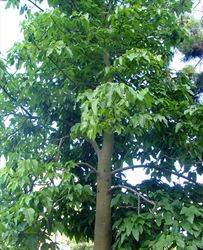
habit (Photo: Sheldon Navie)
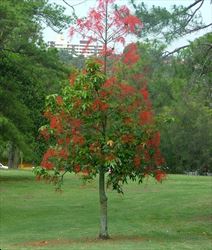
habit in flower (Photo: Sheldon Navie)
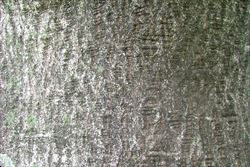
relatively smooth bark on trunk of mature tree (Photo: Sheldon Navie)
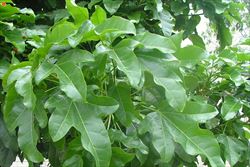
leaves (Photo: Sheldon Navie)

deeply-lobed leaves (Photo: Sheldon Navie)
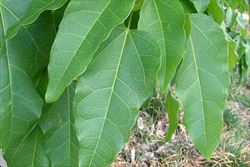
almost entire, elongated leaves (Photo: Sheldon Navie)
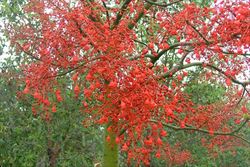
flower clusters (Photo: Sheldon Navie)
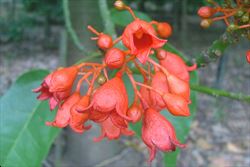
close-up of the bright red bell-shaped flowers (Photo: Sheldon Navie)
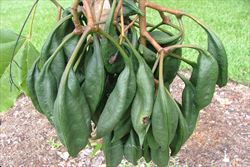
clusters of immature fruit (Photo: Sheldon Navie)

mature fruit with seeds (Photo: Sheldon Navie)

seedling (Photo: Sheldon Navie)
Scientific Name
Brachychiton acerifolius (A. Cunn. ex G. Don) Macarthur
Synonyms
Sterculia acerifolia A. Cunn. ex G. Don
Family
Sterculiaceae
Common Names
Australian flametree, flame bottletree, flame kurrajong, flame tree, flametree, Illawarra flame tree, Illawarra flametree
Origin
Native to some parts of eastern Australia (i.e. the coastal and sub-coastal districts of Queensland and some parts of eastern New South Wales).
Naturalised Distribution
Naturalised beyond its native range in New South Wales and naturalised on Lord Howe Island. Possibly also naturalised in south-eastern South Australia.
Notes
This species is regarded as an environmental weed in those parts of New South Wales that are beyond its native range. Flame tree (Brachychiton acerifolius ) occurs naturally in sub-tropical rainforest along the New South Wales coast, north from the Shoalhaven River, but because of extensive cultivation it has become established in habitats and parts of New South Wales that it did not naturally occupy.
For example, it is regarded as an environmental weed in many parts of the wider Sydney and Blue Mountains region (i.e. in non-rainforest areas). It is also an emerging weed in the southern parts of the New South Wales south coast (i.e. south of the Shoalhaven River).

